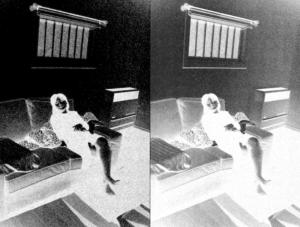When the archive has become so complacent is it any wonder we found a way in?
Every now and again a girl learns to avoid detection and becomes the observer. She learns and subsequently forces herself to forget that in order to infiltrate she will need to remain anonymous. She becomes the spectre.
It may be impossible to establish the beginning of Reparations Press and even more so to create a roster of members who spent time with the organization. Reparations Press registered as an entity with the California Secretary of State in 1993, however, the entity remained suspended until its dissolution last year. Established by a group of artists with common grievances against the archive, this was an organization that went to great lengths to maintain their anonimity.
Since each of us was several, there was already quite a crowd. – D&G
Records describe the collective as angry, grieving and brought together in error, an accident. Others claim it was a group of girls who dedicated their lives to infiltrating the archive in search of proof; a group of girls groomed to collect evidence. A group which despite its grievances with the archive knew no other ends or means and as a result fell apart upon their exile from academia.
In my attempts to construct a history of Reparations Press, my primary obstacle has been identifying the why. Was this a group coerced into the archive? Or was this a careful infiltration carried out by a trained group of grieving academics? Was their work planned and executed or accidental?
Objectively the most underrated member of Reparations Press, Jade D. is currently stationed in North Berkeley where she lives modestly in a cottage style duplex. Last year she accepted an analyst position with the city of San Francisco. We have agreed to disclose no further information regarding her current station.
It is easy to see why Jade D. is left out of so many Reparations Press conversations, she performs so well. I can imagine her first meeting with Llorona. I can imagine the initial skepticism resulting from Jade’s ability to camouflage and willingness to infiltrate; eventually I can also imagine the respect and love that Llorona must have felt knowing that Jade was able to appear so unaffected while playing the part. Willing to operate behind the scenes, Jade D. is given little credit for her role in transforming Reparations Press into an organization that seemed to navigate the archive at its convenience mocking the safeguards put in place by the state.
It is known by few that Jade D. collaborated with Llorona on Reparations Press’ first publication WOC in Academia: A Survival Guide under the pseudonym Scorpio. This collaboration included a radio interview where Jade D. describes herself as the economist, the game theorist, a chameleon. Jade D. went by many names and in doing so prevented recognition.
Less known, misinterpreted, and to some extent hidden is the fact that as one of the founding members of Reparations Press Jade D. developed S.P.O.C., a homing system to locate people of color who were lost to the archive at the turn of the century. Early in the history of Reparations Press the archive is referred to as the canon; it is as Reparations Press approaches its end that we begin to see a shift in their understanding of the archive. The archive shifts to encompass both the building and the documents stored there. The archive as a burial process that tames and and makes palatable that which threatens the authority of the institution.
In leading the development of S.P.O.C. Jade D. created space for collaboration and infiltration. It was a machine for extraction, a machine that refused to be reduced to structure and in doing so countered the archival process. It was a machine able to release trapped desires. S.P.O.C. needed the capability and capacity to unearth, exhume, recall and reset those subjects navigating the archive. S.P.O.C. had the impossible task of accelerating and condensing the archive’s period of closure to return those who were lost to the archive.
We need to go all the way, if we are going to go for it we needed to commit. We won’t make it by pretending so you need to build this to get me out when the time comes. Sometimes I think I have already been here too long.
To create space for collaboration, to create space for infiltration someone had to watch the door. Someone had to keep the guards occupied as Reparations Press traveled in and out of the archive. Someone had to be in charge of bringing them back. Jade D. was the ever present (ever hidden) spectre (spectator).
At their best, Reparations Press interrupted the archival process often in the form of unauthorized gatherings, an alchemy of the living and the dead. Through burial, the function of the archive is to exert complete authority over the dead who if left to themselves aquire a life of their own. In receiving pseudonyms the members of Reparations Press invoked and alchemized with the spectre and in doing so created paths to existence for the spectre among mortals. In these moments of alchemy Reparations Press created scenes of chaos and celebration as the dead and their subjects revelled.
Spending extended periods of time inside the archive had repercussions. Llorona, for example, was lost to the archive for years at a time as she studied the technology of Western aesthetics. La tecnologia de la estetica. During her time in the archive she deduced that Western aesthetics and its institutions functioned as tools to supplement traditional modes of subjugation.
Jade D. reveals that it was during one of these extended stays that Llorona received her pseudonym. LaWar received a call from Llorona in tears one night, she was furious. Llorona just kept repeating how angry she was all the while crying. Before LaWar could ask what had happened Llorona ended the call. There were reports of a wailing woman that night. Jade D.brought her back eventually.
I’ve never heard you say that.
Yes, you have.
But you meant it. You’ve never said it and meant it like that.
S.P.O.C. was not perfect and Jade D. discusses how their dependence on S.P.O.C. contributed to the dissolution of Reparations Press.When the subject is recalled and reset too often (Buried and exhumed. Buried and exhumed. Exhumed. Buried. Exhumed. Exhum—–) the subject’s understanding of time and space begin to resemble a labyrinth. Inside becomes outside. Outside becomes inside. The risk for becoming lost increases.
We thought all we had was time.
S.P.O.C. was used without regard for consequences and Jade D. expresses that the collective had become enamored with power. The group had become become a “bond uniting hierarchized individuals.” The characters had become exhausted, recognizable and one by one the individuals were exiled from the archives.

